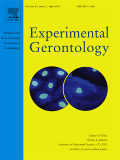
EXPERIMENTAL GERONTOLOGY
Scope & Guideline
Exploring Interdisciplinary Approaches to Enhance Healthspan
Introduction
Aims and Scopes
- Aging Mechanisms and Biology:
The journal emphasizes studies that explore the fundamental biological processes of aging, including cellular senescence, mitochondrial dysfunction, and neurodegeneration. - Interventions for Healthy Aging:
Research on interventions such as exercise, dietary modifications, and pharmacological treatments that can enhance healthspan and quality of life in older adults is a key focus. - Psychosocial and Cognitive Aspects of Aging:
Papers addressing the psychological and cognitive changes that occur with aging, including studies on mental health, cognitive decline, and social interactions among older adults. - Sarcopenia and Muscle Health:
The journal regularly publishes research on sarcopenia, muscle strength, and interventions aimed at preserving muscle mass and function in the aging population. - Chronic Diseases and Aging:
The relationship between aging and the prevalence of chronic diseases, including cardiovascular diseases, diabetes, and neurodegenerative disorders is a significant area of study. - Environmental and Lifestyle Factors:
Research on how lifestyle factors, including physical activity, nutrition, and environmental influences, affect aging processes and outcomes.
Trending and Emerging
- Immunosenescence and Inflammaging:
Recent studies increasingly focus on the role of immune system aging and chronic inflammation in various health outcomes, emphasizing the interplay between immunity and aging. - Microbiome and Aging:
Research exploring the gut microbiome's impact on health and aging has gained momentum, highlighting its role in metabolic processes, immune function, and cognitive health. - Physical Activity and Functional Resilience:
There is a growing emphasis on the benefits of physical activity not only for physical health but also for cognitive function and psychological resilience in older adults. - Technology and Aging:
The integration of technology in aging research, including telehealth, wearable devices, and virtual reality for rehabilitation and monitoring, has emerged as a significant trend. - Personalized Interventions:
Emerging interest in personalized medicine approaches tailored to individual aging profiles, including genetics, lifestyle, and health status, is increasingly evident in recent publications.
Declining or Waning
- Traditional Pharmacological Approaches:
There is a noticeable decline in studies solely focused on traditional pharmacological interventions for aging-related conditions, as the field shifts toward holistic and integrative approaches. - Single-Species Model Studies:
Research utilizing single species models, particularly those that do not translate well to human aging, has become less prevalent, with a greater emphasis on translational and human-centered studies. - Aging and Gender Differences:
While gender differences in aging were once a prominent theme, there is currently less focus on this area as the field moves towards understanding aging as a more universal process.
Similar Journals

EXPERIMENTAL AGING RESEARCH
Pioneering Insights into the Aging ProcessEXPERIMENTAL AGING RESEARCH, published by Taylor & Francis Inc., is a leading journal that has been at the forefront of aging research since its inception in 1975. With an ISSN of 0361-073X and an E-ISSN of 1096-4657, this journal has earned a notable reputation, including a Q3 ranking in the field of Aging and impressive Q1 and Q2 rankings in Arts and Humanities and Geriatrics and Gerontology respectively. This positions the journal within the top percentile of its category, highlighting its significant impact and contribution to the scientific community. Covering a broad scope that intersects various disciplines, EXPERIMENTAL AGING RESEARCH aims to disseminate pioneering research, foster interdisciplinary collaboration, and provide a platform for innovative studies that enhance understanding of the aging process. While it currently does not offer Open Access, researchers and academics can access its rich repository of knowledge that spans multiple facets of aging, from physiological changes to psychological impacts. As the field of aging continues to evolve, this journal remains an essential resource for researchers, professionals, and students dedicated to advancing knowledge and practices concerning aging and longevity.

European Journal of Geriatrics and Gerontology
Fostering collaboration in geriatric and gerontological studies.Welcome to the European Journal of Geriatrics and Gerontology, a peer-reviewed platform dedicated to advancing knowledge and research in the fields of geriatrics and gerontology. Published by GALENOS PUBL HOUSE, this journal serves as a critical resource for researchers, healthcare professionals, and students who are involved in the care, treatment, and study of elderly populations. Since its inception in 2019 and running through 2024, the journal aims to foster interdisciplinary collaboration and disseminate innovative research that addresses the unique challenges faced by older adults. With an ISSN of 2687-2625, the journal is classified in the Q4 quartile of the Geriatrics and Gerontology category, signifying its emerging influence within the academic community, despite its current Scopus ranking of #113 out of 116, reflecting a rich opportunity for growth and visibility. Although the journal is not open access, it maintains a commitment to scholarly rigor and quality. Engage with the European Journal of Geriatrics and Gerontology to contribute to and learn from the evolving discourse in aging research.

Lancet Healthy Longevity
Transforming Aging Through Interdisciplinary CollaborationThe Lancet Healthy Longevity is a premier journal published by Elsevier that focuses on advancing our understanding of healthy aging and longevity through interdisciplinary research. Established in 2020, this Open Access journal is committed to disseminating innovative findings that enhance public and individual health, making it accessible to a global audience. The journal is proud to be recognized with a Q1 ranking in critical categories such as Family Practice, Geriatrics and Gerontology, Health (Social Science), and Psychiatry and Mental Health, indicating its prominent role in shaping contemporary discourse in these domains. As one of the leading titles within the field, it holds an influential position in Scopus rankings, with top placements in Geriatrics and Gerontology as well as Family Practice, thereby reaching the 99th percentile of scholarly impact. The Lancet Healthy Longevity aims to foster collaboration among researchers, healthcare professionals, and policymakers to promote healthy longevity, ultimately supporting the growing aging population worldwide. With its commitment to high-quality research and global accessibility, this journal is a vital resource for those dedicated to improving health outcomes across the lifespan.

BIOGERONTOLOGY
Unraveling the Mysteries of Longevity and HealthBIOGERONTOLOGY, published by SPRINGER, is a premier journal dedicated to the interdisciplinary study of biological aging processes and their implications for health and longevity. With an ISSN of 1389-5729 and an E-ISSN of 1573-6768, this journal features cutting-edge research that addresses critical questions in the fields of aging, geriatrics, and gerontology. Ranking impressively in the top quartiles, particularly as Q1 in Gerontology, BIOGERONTOLOGY is recognized for its contributions to advancing the understanding of aging at both molecular and systemic levels. The journal’s rich repository of scholarly articles provides valuable insights for researchers, healthcare professionals, and students alike, fostering a deeper comprehension of age-related biological mechanisms. Although not an open-access journal, it is highly regarded with an impact factor that reflects its significant role in the academic community. The journal spans from 2000 to 2024, ensuring a broad historical context for its studies, and is based in the Netherlands, with its administrative office located at One New York Plaza, Suite 4600, New York, NY 10004, United States. Engaging with BIOGERONTOLOGY means joining a global dialogue on the science of aging and the implications it holds for humanity.

Journal of Nutrition Health & Aging
Advancing the science of aging through nutrition.Welcome to the Journal of Nutrition Health & Aging, a prestigious publication dedicated to advancing knowledge in the critical fields of nutrition, gerontology, and geriatrics. Published by Elsevier Science Inc, this journal boasts an impressive impact factor and is recognized in the top quartile (Q1) of multiple categories including Geriatrics and Gerontology, Medicine (miscellaneous), and Nutrition and Dietetics. Since its inception in 1997, it has served as a vital platform for researchers, practitioners, and students alike to disseminate innovative research and practical applications relevant to aging populations. With a Scopus rank placing it in the top 15% of its field, it underscores its commitment to high-quality and impactful scholarship. Although it is not an open access journal, its significant reach ensures that valuable insights will continue to inform best practices and policy decisions in health and nutrition. We invite you to explore and contribute to this vital conversation surrounding health and well-being in older adults.
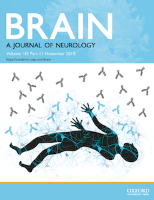
BRAIN
Transforming Medical Research through Rigorous Peer ReviewBRAIN, published by Oxford University Press, stands as a preeminent journal in the realms of neurology and medicine, with a formidable impact factor reflecting its rigorous peer-reviewed standards and significant contributions to the field. With its ISSN 0006-8950 and E-ISSN 1460-2156, this esteemed publication spans over a century of exceptional research, converging from its historical roots in 1878 to current groundbreaking studies. BRAIN boasts a distinguished rank of #8 out of 400 in the Scopus category of Neurology (Clinical), placing it in the 98th percentile of institutions, indicative of its influence and reach. Operating under the Q1 category in both Medicine (Miscellaneous) and Clinical Neurology, the journal is dedicated to fostering interdisciplinary dialogue among researchers, clinicians, and students alike. With a focus on innovative findings and clinical advancements, BRAIN serves as a vital resource for those seeking to deepen their understanding of neurological disorders and the evolving landscape of medical research.
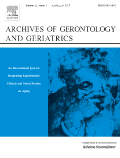
ARCHIVES OF GERONTOLOGY AND GERIATRICS
Innovating insights into the biology and psychology of aging.The Archives of Gerontology and Geriatrics, published by Elsevier Ireland Ltd, is a leading journal in the fields of Aging and Geriatrics and Gerontology. With an ISSN of 0167-4943 and an E-ISSN of 1872-6976, it has established itself as a crucial platform for disseminating high-quality research focused on the biological and psychosocial aspects of aging. The journal holds an impressive Q2 ranking in both Aging and Geriatrics and Gerontology, and a Q1 ranking in Gerontology and Health (Social Science) as of 2023, reflecting its significant impact in these disciplines. Additionally, the journal is ranked #33/371 in Social Sciences (Health) and #5/39 in Nursing (Gerontology) according to Scopus, showcasing its esteemed position in the academic community. Although currently not open access, the journal offers a wealth of research articles from 1982 to the upcoming 2025 that are vital for stakeholders including researchers, healthcare professionals, and students aiming to advance their understanding of aging processes and policies. Titles published within its pages contribute to shaping agendas in public health and gerontological practice, making it an essential resource for those involved in the study of the elderly population.
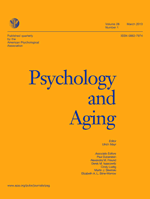
PSYCHOLOGY AND AGING
Unraveling the complexities of aging with psychological rigor.Psychology and Aging, published by the American Psychological Association, is a premier journal dedicated to advancing the field of psychology as it relates to aging. ISSN 0882-7974 and E-ISSN 1939-1498, this esteemed journal has been a key resource since its inception in 1986 and continues to shape the discourse surrounding aging-related psychological phenomena. The journal boasts impressive rankings in various academic categories, placing in Q2 for Aging, Q1 for Geriatrics and Gerontology, and Q1 for Social Psychology in 2023, highlighting its significance in multiple disciplines. With Scopus rankings that position it within the top tier of psychology and medical journals, Psychology and Aging serves as a vital forum for researchers, professionals, and students alike, facilitating the exchange of rigorous empirical research and novel theoretical insights. This journal is instrumental in elucidating the complexities of psychological function across the lifespan, ultimately contributing to improved interventions and policies affecting older adults.
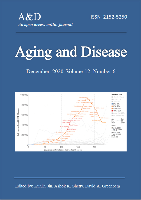
Aging and Disease
Illuminating pathways to better health in aging.Aging and Disease is a leading open-access journal published by the International Society on Aging and Disease, dedicated to advancing the understanding of aging and its associated diseases. Since its inception in 2010, the journal has established itself as a vital resource for researchers and practitioners in the fields of Geriatrics, Neurology, Cell Biology, and Pathology. With an impressive Q1 ranking across multiple categories and a robust position in Scopus rankings, including ranks in the top 3% in Geriatrics and Gerontology, it showcases high-quality research that addresses the complexities of aging processes. Each issue presents original articles, reviews, and insights aimed at improving health outcomes for the aging population. The open-access model ensures that valuable research findings are readily available to a global audience, fostering collaboration and innovation. As a go-to publication for scholars, healthcare professionals, and students, Aging and Disease significantly contributes to the multidisciplinary dialogue surrounding aging and its health implications.
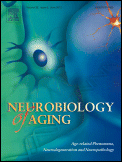
NEUROBIOLOGY OF AGING
Transforming Understanding of Aging Through NeurobiologyNEUROBIOLOGY OF AGING, published by Elsevier Science Inc, is a premier journal dedicated to advancing our understanding of the complex interactions between the aging process and neurobiological mechanisms. With an ISSN of 0197-4580 and E-ISSN 1558-1497, the journal has established itself as a critical resource in the fields of Aging, Developmental Biology, Geriatrics and Gerontology, Clinical Neurology, and Neuroscience. Boasting a Q1 ranking in multiple categories, the journal is positioned within the top echelons of scholarly publication, underscoring its significant impact with an impressive Scopus ranking in various subfields. Committed to disseminating high-quality, peer-reviewed research, NEUROBIOLOGY OF AGING welcomes original articles, reviews, and research notes aiming to uncover the underlying processes of aging on the nervous system, fostering collaboration among researchers, professionals, and students alike. Although primarily subscription-based, the journal continues to play a vital role in shaping the discourse on aging and neurobiology, making it an essential publication for those engaged in this dynamic field.